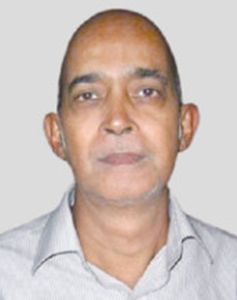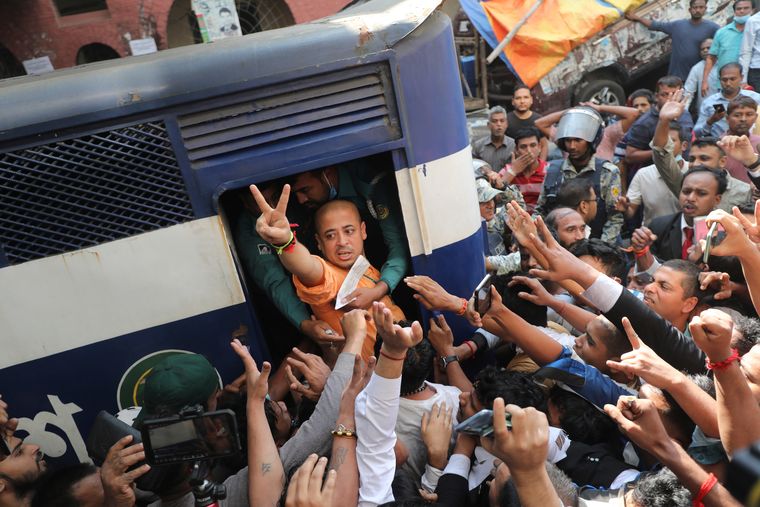ON DECEMBER 5, about three months after he took oath as the head of an interim government following the ouster of Sheikh Hasina, Muhammad Yunus urged all political parties in the country to unite. His call came at a meeting with leaders of the Bangladesh Nationalist Party, the country’s second biggest party after Hasina’s Awami League, the fundamentalist Bangladesh Jamaat-e-Islami and a clutch of Islamic groups. Awami League and its ally Jatiya Party, founded by former military dictator Hussain Muhammad Ershad, were not invited to the meeting.
By several accounts, the atmosphere at the meeting’s venue―the Foreign Services Academy―was sombre, quite different from the euphoria over the ouster of the “fascist” Hasina regime in July-August. The triumphalism has now been tempered with a sense of anxiety over the future in the absence of a clear roadmap. Bangladesh today finds itself at a crucial juncture with the interim government busy firefighting the fallout of alleged atrocities against Hindus. The arrest of former International Society for Krishna Consciousness (ISKCON) member Chinmoy Krishna Das, who had been helming street protests by Hindus across Bangladesh under the banner of Bangladesh Sommilito Sanatani Jagaran Jote (United Sanatan Awakening Alliance), added fuel to the already raging fire in Bangladesh’s political cauldron. The protests and clashes after the arrest and the killing of a Muslim lawyer point to two things: One, the law and order situation remains anything but stable, and two, it has taken a communal colour.
The issue of the ill-treatment of minorities could not have come at a more inopportune time for Yunus, who had just set about handling two of the most crucial challenges―reforming the election commission and the country’s constitution and holding the national elections. His reform of Bangladesh’s governance structure and democratic institutions is aimed at purging them of the elements associated with the 15-year-old Hasina regime in the bureaucracy, the judiciary and the media. The intention, apparently, is creating a bulwark against the Awami League and stopping Hasina’s return to power. It is this “stop-Hasina and Awami League” objective which binds Yunus, the BNP and the Jamaat together.
Yunus is engaging the BNP and the Jamaat, which are known for rightist and fundamentalist orientation in varying degrees, for shaping Bangladesh’s political future bound by the anti-India strain. The Jamaat opposed the very idea of an independent Bangladesh while the BNP’s ideology of Bangladeshi nationalism contains a subtle anti-India element. The BNP has weaponised Bangladeshi nationalism (based on political boundary) to attack the Awami League’s Bengali nationalism (based on language). These two contrasting strains of identity politics have played out in Bangladesh for nearly half a century.
BNP leaders are speaking in divergent voices on the issue of reforms and elections. In the first three months after Yunus took over, the party had been consistent and hard in its demand for early national elections. Its secretary Mirza Fakhrul Islam Alamgir even chided the Yunus dispensation for contemplating sweeping reforms of the constitution and democratic institutions and said that it should be left for an elected government. Alamgir questioned the interim government’s constitutional legitimacy and insisted that its only job was to conduct a free and fair poll. But, of late, the party has been saying that the interim government should be given enough time to conduct the reforms for ensuring a credible, free and fair election.
The Yunus government, the BNP and the Jamaat became jittery after the victory of Donald Trump in the US presidential election. More so after the issue of the atrocities against minorities figured in a telephonic conversation between Indian Prime Minister Narendra Modi and Trump. Yunus had openly sided with Trump’s opponent Hillary Clinton in the 2016 presidential election. The uncertainty over Trump’s Bangladesh policy and the anti-India strain in their political ideologies have forced the BNP, the Jamaat and Yunus to set aside their mutual differences and talk of national unity.
There is no documentary evidence to show that the US, under Joe Biden and its “deep state”, were behind the regime change in Bangladesh. But there is tell-tale proof that the students taking to the streets against Hasina ostensibly on the issue of ending the quota for freedom fighters in government jobs was a meticulously planned exercise. That the quota was never the issue came out clearly a few days after the start of the anti-Hasina agitation as the protesters kept shifting the goalposts before finally admitting that they would not settle for anything less than Hasina’s removal. A key pointer to the agitation’s support base beyond the borders of Bangladesh was available soon after Hasina fled Dhaka, when countries like the US, China and Pakistan showed remarkable alacrity to welcome the change.
How does the future of Bangladesh’s political landscape look like at this juncture? There are two broad scenarios. When Yunus took the reins of power, the assessment by non-Awami League parties and a section of the interim government was that his inexperience would show up. It did, indeed, as far as the law and order and the management of the economy were concerned. The runaway inflation has become worse than during the Hasina rule. Hasina is seeking to tap into this discontent and has become quite vocal in her criticism of the interim government. But she needs to revive her party’s demoralised rank and file and make it battle-ready in the event of fresh elections.
It is likely to take at least a year for things to settle down for the interim government. On the political front, Yunus may ride on the expansion of an existing forum or a new party floated under the leadership of coordinators of the students’ movement. But a final electoral plunge hinges on an assessment of the prospects of a commanding majority in the 330-member Jatiya Sangsad, Bangladesh’s parliament.
Bhattacharya is a senior journalist in Bangladesh.




